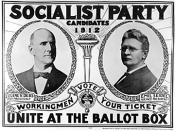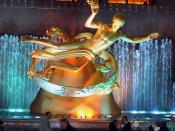According to historians, the rise of progressivism at the turn of the century preserved the capitalist system. Explain this statement. You will need to discuss the nature of the American capitalism at the time, the threat to its continued existence, and the composition of the progressive party.
"God gave me my money," averred John D. Rockefeller. Men such as John Rockefeller and Andrew Carnegie controlled the American economy at the turn of the century through large monopolies. As the wealth of Carnegie and Rockefeller grew, their employees floundered. As the rich got richer, the poor got poorer and slowly the workers became disenchanted with the capitalist system and looked for alternatives. As the socialist party gained power, a new party emerged, known as the progressive party, headed by Theodore Roosevelt. The progressive party moderated the backlash of the workers' socialist movement and prevented fall of the American capitalist system.
America at the turn of the century was a decidedly tough place to live. The influx of immigrants, along with a shortage of jobs, brought the wages paid to laborers to rock bottom levels. To survive, families frequently needed more than two breadwinners and children were pushed into the job-market at early ages in order to support their families. However, a child that was working had no chance to receive an education, and therefore was condemned to poverty. The American dream of doing whatever you set your mind to was unattainable to the average American who worker, whose greatest wish was simply to be able to feed his family. Men such as Carnegie and Rockefeller however, profited greatly off of the dirt-cheap labor and amassed huge fortunes. Instead of giving the money back to the workers, the business owners of the time believed in paternalism, and therefore would build libraries...


